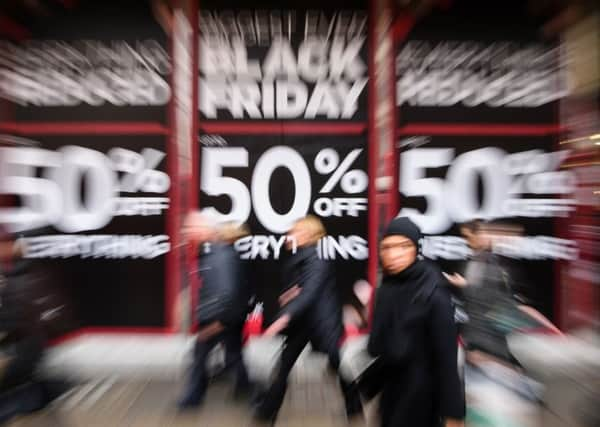Martyn McLaughlin: Stay at home if you want to find good deals this Black Friday


There is a little-visited section on the website of Amazon, one of the world’s largest retailers, which ought to dissuade those bargain hunters planning to rise at the crack of dawn this Friday in the hope of securing discount deals in time for Christmas.
“Sometimes,” the retailer coyly notes,” when we lower prices as part of a promotion, other retailers will decrease their own prices in response. As a result, we may decrease our price during the promotion, and after the promotion our price may be the same or even lower than the original promotional price.”
Advertisement
Hide AdAdvertisement
Hide AdThere, in black and white, is proof that Black Friday is a ruse. Anyone with a rudimentary interest in retail economics will not be surprised at such small print. In recent years, leading high street and online retailers in Britain have followed their US counterparts in amplifying this non-event to the extent that it has become a staple of the calendar.
The whole enterprise is a classic and, frankly, crude psychological ploy that results in a clamour for entirely phantom sales. Recent research carried out by Which? scrutinised 178 deals from last year’s Black Friday sales, tracking the daily price changes of 20 popular electrical items sold by the likes of Amazon, AO, Argos, Curry and John Lewis over a five month period.
It established that only 90 deals were cheapest on Black Friday itself. In Currys, a Samsung television on offer for £748 had been on promotion at £699 in September. A Vax vacuum cleaner being sold by AO, meanwhile, was priced at £99 and advertised as a £200 saving. The day before Black Friday, however, it was on offer for just £69. In the three months leading up to the big sale day, its average retail price was still cheaper, at £96.50.
There have been similar studies conducted over the past two years, giving rise to expectations that the Black Friday bubble was set to burst. In the build up to last year’s sale, the talk was of retail fatigue, contributing to a growing sense that this was one US custom that had outstayed its welcome.
Predictably, the figures that followed revealed the precise opposite. According to IMRG and Experian, sales reached £1.1bn, a 35 per cent increase on the same day in 2014. Over the course of the weekend, which includes the lamentably named Cyber Monday, shoppers spent a total of £3.3bn.
There is little reason to suppose 2016 will be any different. In fact, there is a belief that those numbers will rise yet again. Already there is excitable chatter about the jingling at the tills. Some analysts suggest this year will usher in the “best deals ever” as a result of the so-called “Brexit boost,” with deep discounting becoming increasingly widespread as a result of economic uncertainty and projected price rises in 2017. In other words, forget the looming misery of nosediving living standards and a plummeting pound - there’s a BOGOF on Nutribullets.
Why is it that shoppers are so gullible when it comes to Black Friday, despite their better judgement? A recent survey found that 31 per cent of people believe the deals on offer on Black Friday are no better than other promotions held throughout the rest of the year.
In any case, there is no shortage of means and methodologies at hand for punters to bypass hoary sales tactics and disingenuous pricing. From voucher codes that are widely distributed across internet forums and cashback schemes such as Quidco, to savings websites like HotUKdeals and price comparison apps that can be accessed via smartphones, the modern consumer is well placed to cut through the chaff and secure a genuine bargain - that is, an item priced cheaper than they originally intended to pay for it.
Advertisement
Hide AdAdvertisement
Hide AdThe vast majority of people are accustomed with these kinds of techniques and routinely employ them to shave pounds and pence off their weekly shopping baskets, yet this has done nothing to end the ritual of queues hundreds strong forming in the dead hours of early morning, with the especially eager pitching tents by the doors.
The spectacle, condemned as a symbol of a bankrupt consumer culture by a media which also acts as its fevered cheerleader, is not strictly about savings. One of the main reasons for Black Friday’s enduring popularity is down to something else, another sales trick that is as old as the hills: the fear of missing out. It has been a long time since any shopfront displayed the legend ‘While stocks last!’ The slogan may have worn old but its message lives on through the hysteria of Friday’s event.
That, I think, drives the inexplicable desire for people to wait in line at 4am for a tumble dryer. There is a participatory zeal that convinces people they must hit the shops instead of making their purchases online. The savings may be the same, but there is a visceral thrill to securing them in person.
Shoppers cast themselves as lead actors in an emotional brand event, a form of theatre I simply can’t understand. The backlash against Black Friday routinely stems from a sanctimonious insistence that Christmas is being sullied, but the argument against rampant commercialisation of this special season has long been lost.
Instead, there is an entirely rational reason to stay away from the shops this Friday. Simply put, you won’t make the savings you think you will, and in an effort to compensate, you’ll likely end up buying something you neither need nor want. Stay at home, and if you have to spend, do your research.